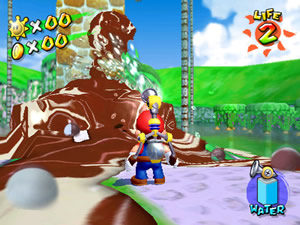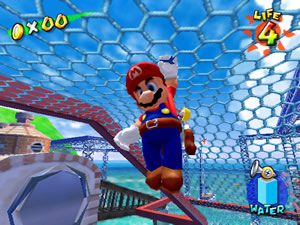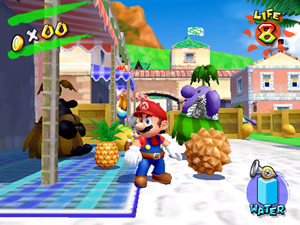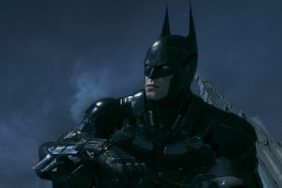Let the sunshine in.
Its-a me… Maaaaah-rio! Whaat?!
How could yah fuggedabout MAAAAH-RIO? Dat really hurtsa my feelings.
Okie-dokie… so mebbe I spread myself a little thin, what with all-a my
drunken
paaarties, medical scams,
and illegal fight clubs…not to mention
dat NO GOOD brother of mine who goes and steals dah spotlight. Mama-mia! Luigi
makes-a Freddo look like a rocket
scientist!
But now, I’m-a getting back to what I LOVE to do – JUMPIN’ on-a things!
Yeah! You wanna something jumped on?!? I go and jumpah on it, good and nice.
Mebbe a bully is pickin’ ona you. Yes? I go smash-a his head with-a my feet,
kapish?
Yes,
Mario, the most violent video game character EVER, is back to his old tricks
in Super Mario Sunshine. Reckless stomping! Coin theft! Careless brick
destruction! And now Mario’s spraying water up in everyone’s business, thanks
to his water spraying FLUDD unit.
Super Mario Sunshine plays like an evolved form of Super Mario 64,
combined with the best ideas from Luigi’s
Mansion and the stylistic touches of Super Mario World 2. While this
isn’t an altogether epic quest or a ballyhooed Second Coming of Mario, it is
simply a very fun game with ample difficulty in the right places, and that special
elfin magic that keeps you playing long into the night.
Mario, Princess Peach, and their entourage of Toadlings are off to the tropical getaway of Isle Delfino for some much needed rest and relaxation. Unfortunately, trouble is a’ brewin’ in the form of a shadowy mustached figure, wielding a paintbrush that has been used to literally paint the town red.
The mess of graffiti and pollution incites the once peaceful islanders to take arms and point their judgmental fingers at Mario, damning him to clean up the toxic soup throughout the island. In between helping out the local folk, running races, collecting coinage and washing out some goo, Mario will uncover just who is behind this frame-up mix-up.
Originally, I was slightly put off by the idea of a hydromatic backpack. It
just doesn’t sound like “Mario.” Mario is a dress up kind of guy. Whether he
dons a cape, a frog suit or a tutu, Mario has always been the video game world’s
proletariat
everyman. And after beating Super Mario Sunshine I still think it
doesn’t completely feel like Mario. It feels like Mario grafted with a strange
gameplay gimmick. Thankfully, however, the welding manages to tie in smoothly
enough. The FLUDD unit is a welcome companion, but I doubt I’d want to see it
in the next Mario installment.
The FLUDD unit can spray out a stream of cleansing water or switch into a jet-pack, giving Mario the ability to briefly hover across any surface. Mario can spray a short burst of water and then dive in for a slip-and-slide shoot forward. Further into the game, Mario can find other attachments, such as a rocket jump and a turbo motor.
The water pump only works using the inverted flight stick approach, where
down aims up, and up aims down. It takes a little getting used to, but will
soon become second nature. Mario retains most of his 64 moves, from the
ground pound to the somersault, but these two moves now use analog stick rotations
due to the elimination of a duck move.
Previously, Peach’s castle served as the central hub for the different levels.
Super Mario Sunshine broadens that approach, transforming the entire
town of Delfino Plaza into a launchpad for adventure, replete with secrets and
entry portals laden throughout the nooks and crannies of this seaside burg.
The vast levels take on a tropical bend, from the Pinna Amusement Park to
the picturesque accommodations at Hotel Delfino. Each of the level has 8 primary
objectives; upon completion of an objective, you are awarded with a Sun Sprite,
Sunshine‘s version of the traditional star. Some of the levels even slightly
change with each new objective to complete.
 The
The
objectives range from boss matches to red coin hunts and catch-up races. Sometimes
you might have to chase and spray down a rampant Shadow Mario. The most interesting
objectives are the less straightforward ones that require more thought work.
Blue coins are also scattered throughout the level, 10 of which buys a Sun Sprite.
Sometimes objectives require Mario to be transported to an otherworldly realm
made up of a single maze floating in the sky. Most of these areas resemble the
obstacle course style of the final level of Super Mario 64. There’s even
one hidden challenge that’s a giant Pachinko machine.
I have mixed feelings about these alternate realm areas. On the one hand,
the increased difficulty is a great and welcome challenge. But these mazes feel
more like Mario VR Missions than useful parts of Sunshine. The lack of
environmental context turns these labyrinths into a straight A to B exercise.
If you die while you are within a normal level, you are returned to the central
plaza. It can get annoying when you just want to keep trying the level over
but keep getting brought back to watch the same cutscenes and slight pre-level
load times.
From nearly every level, you can look out into the distant horizon and spot
one of the other levels. Everything fits together into a big dolphin shaped
island, though there are invisible walls separating each of these “levels.”
I understand the reasoning behind keeping everything in its place and maintaining
the level structure, but it’d be neat to run a nonstop marathon through Delfino.
At any rate, the game captures a distinct, fun visual style. Through pastoral fields of pastel green and whipping waves of torrid water, there’s a dichotomy of cartoon and reality, detail and abstracts, clashing together to create a beautifully unique look. You can just feel the warmth in the bright colors and you’ll appreciate the reflection and refraction through streams of water and rays of heat. Rarely has Mario looked so good.
The camera still isn’t perfect, but is more easily maneuvered via the C-stick. Solid objects can still get in the way, though the game tries a mediocre workaround by highlighting a silhouette of Mario when blocked. The most problematic areas are narrow spaces, especially those with metal grates. All in all, the camera is less of a major issue this time around, and you’ll get used to it.

Yoshi also makes a visit in the game, with the almighty power to regurgitate a constant stream of fruity juice (I had that power in Kindergarten, but I relinquished it for the good of mankind). Mostly, you’ll use Yoshi to collect some ancillary blue coins, but the biggest surprise is…
…Yoshis melt in water! The first time I accidentally stepped into the deep
end of the ocean, Yoshi just melted away into droplets of ink. He even yelped
out a final cry before his untimely watery doom. It’s really sad – they just
don’t make Yoshis like they used to.
The denizens of Isle Delfino could use some more conversation bites. Even if
you complete a task, a villager or one of your Toad buddies will still be lobbying
the same complaint over and over. The FMVs do a middling job telling the story,
which really isn’t too complex to begin with. During one scene, the music practically
drowns out everything being said.
From the jive beat of a cymbal to the bass of approaching danger, the music
is peppy with mixes aplenty of classic Mario tunes. The most memorable piece
is an a capella version of the original Super Mario Brothers song,
complete with voices going “doot doot doo do doo doooo do.” The voices are off
kilter, but it’s practically a mainstay of Mario games now to have odd voices.
In the same way that Super Mario World 2 doesn’t directly feel like
a Mario game, Super Mario Sunshine engenders a “side-story” feel.
It lacks an epic quality – the knock down, drag out, “entire Mushroom Kingdoom
at stake” vibe that has been common in so many other Mario games. Nonetheless,
the game does deliver lots and lots of fun in an artistically rich dose of 3D
platforming. Besides, it’s great to get back to what Mario does best – jumpin
on-a things!

-
Fun!
-
Artistically stunning
-
Great level design
-
Hose and nozzle gameplay
-
The challenge of the floating mazes...
-
...that sometimes feel out of place
-
Improved, but still imperfect camera
-
Not really an epic scope







